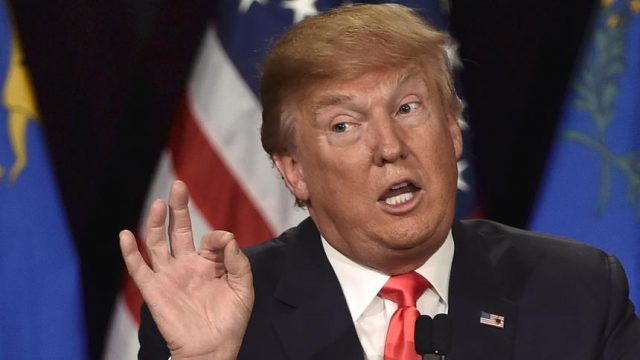John Andrist: Trying to Think Like a Rich Man Thinks

U.S. Republican presidential candidate and businessman Donald Trump speaks at a campaign rally at the South Point Resort and Casino in Las Vegas, Nevada January 21, 2016. REUTERS/David Becker
As a day dreaming kid I remember wondering what it would be like to be a millionaire. Funny? Sure, I was a depression kid who found joy in unexpectedly finding a penny.
But I got there not from any personal brilliance, but from a couple simple formulas. No matter how much you earn, don’t spend all of it; never use debt to purchase anything you do not absolutely need, like toys, luxury cars, lake homes, golf carts, snowmobiles, etc.; store the balance and get old.
It helps to be a born tight wad who has some gift for finding the cheapest motels and avoiding the most expensive restaurants and their most costly entrees . . . and to have a stronger thirst for diet cola than for expensive booze.
And yet, despite having found considerable joy in giving some of it away, my eye still turns when I can make a buck.
So now I sometimes page through a copy of Forbes, a magazine that deals in wealth, and the wealthiest among us — those who are billionaires. They don’t bother with millionaires these days.
Call it my alternative to People magazine, which is more about a different kind of wealth and fame.
[mks_pullquote align=”right” width=”300″ size=”24″ bg_color=”#ffffff” txt_color=”#000000″]I’m not sure what it is like to be a billionaire. I don’t personally know one, but one thing I’ve learned is that they are really not that different from millionaires, thousandaires and paupers. They all want more.[/mks_pullquote]
I’m not sure what it is like to be a billionaire. I don’t personally know one, but one thing I’ve learned is that they are really not that different from millionaires, thousandaires and paupers. They all want more.
Some are great philanthropists. Bill and Melinda Gates are on track to become the largest charitable givers in history.
Some continue to gather and grow their pile while driving old Chevys and wearing well-worn clothes. Some, like George Soros, are so far left that they endow all sorts of liberal causes, unlike the majority of their rich brethren who tend to be strong right leaners.
Most of us think of Donald Trump when we hear the term billionaire. But he is really small potatoes among the very rich, a worth of only $3.5 billion according to Forbes. His Florida estate on Palm Beach Island sits among at least 15 or 20 who are richer than he is. I’ll bet that upsets him.
We tend to scorn billionaires in politics, but virtually all of them are dissipating some wealth in order to serve. Even Trump. Only the small timers like congressmen and the Clintons actually make money in politics.
Yet an old cliche describes all of us, rich and poor: We have our own insecurities, our own health issues, our own needs for love and acceptance. And we all put our own pants on the same way every morning.
Red and blue
You read and hear a lot of red state/blue state stuff these days. But the great divide in America these days is not found in states as much as in cities.
The left bastion is urban; the right is in rural and small town communities.
Minnesota, for instance, has long been labeled as Democrat. But outside of the Twin Cities and Duluth, it’s pretty darn scarlet.
Virtually every city with a population of 100,000 votes Democrat. An Atlantic magazine article notes Phoenix, Oklahoma City, Fort Worth, and Salt Lake City were the only major cities in the country to vote Republican in 2012.
In the sticks we practice more in-your-face politics and we have a lower common denominator of tolerance.
One of the reddest states, Texas, is that way despite high Democrat majorities in Houston, Dallas, Austin, and San Antonio — it’s four largest population centers.
So the reason North Dakota, South Dakota, and Wyoming have become so red is likely because they don’t have any mega-cities.
It hasn’t always been that way, of course. There was a time when any North Dakotan listening to election returns, knew that Democrats and NPL candidates would gain ground when the rural votes were counted.
I have a little different theoretical take on this great divide. Rural communities have more of a do-it-yourself culture.
City folks for the most part feel like spectators and somewhat powerless to change anything they don’t like, so they are more likely to reach for big government answers.
Right or wrong, I guess, it is what it is.




